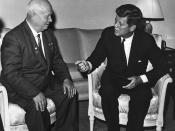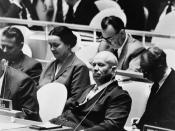Nikita Sergeyevish Khrushchev became the Soviet leader shortly after the death of the previous Soviet leader Stalin in 1953. Everyone hoped that Khrushchev would bring a period of "thaw" in the Cold War. Although his intentions were noble the US remained cautious about the Soviet Union. Khrushchev tried various ways to help reduce the tension between the USSR and the Western countries, namely the United States, but they were only successful to a certain extent.
Within his own borders, Khrushchev was only somewhat successful in reducing tension. Khrushchev gave a "secret speech" to the 20th Party Congress on February 25th 1956. Here Khrushchev attacked Stalin and claimed he was a murderer and a tyrant and pushed for reform in the USSR and in Eastern Europe. He introduced the concept of "destalinzation". Destalinization encouraged those living in the Eastern Europe bloc to believe that under his rule, they would never have to go through what Stalin put them through.
He was willing to give them more independence and freedom. This became the foundation for many independence movements across Eastern Europe. He also tried to patch relations with Eastern European countries. In 1955, Khrushchev visited the President of Yugoslavia, Tito, and told him that "there are different roads to communism". When strikes broke out in Czechoslovakia and East Germany in 1953, Khrushchev sent in the Red Army. This action resulted in the arrest of thousands and the death of hundreds. Similarly, in the crises in Poland and Hungary, Khrushchev tried his best to appease to the people, for example when he put Gomulka and Nagy into power. But when they bordered dissent, Khrushchev put his foot down. His attempts to reduce tension in his own country were not always successful. Although he promoted change, the Iron Curtain would still remain in place.


